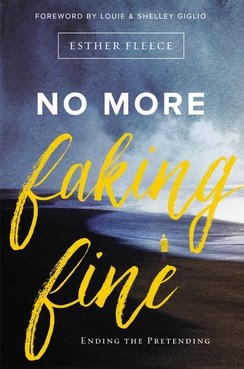God Wants Our Sad
By Esther Fleece
I’ll bet you can remember some of the pivotal moments that taught you to fake fine to one degree or another. Maybe you grew up being told that boys don’t cry, so you stuffed your pain deep inside. Maybe you had all the right clothes and all the right friends and all the right grades, but you never invited friends over — because then they’d know the mess you lived with at home. Maybe you were told that if you just did certain things and clicked your heels, you’d have the good life you’ve always wanted — you know, the one the prosperity gospel is always promising — but you haven’t even glimpsed it on the horizon.
The story our culture tells us — and even some misguided churches — is that health, wealth, and prosperity can and should be ours. As Americans, we are often led to believe we are entitled to these things. We are led to believe life should be easy, and we should be happy.
So, of course, when life crashes hard, we believe something must be wrong with us. And that’s exactly what I began to believe.
I was always wanting more, wanting to do more, and wanting to make a bigger impact for the Kingdom. But suddenly I felt my efforts were as useless as banging my head against a brick wall. I didn’t go to a university to be unemployed, and I certainly hadn’t built a home for myself only to be living with family again at the age of thirty. I was taught I could be anyone and do anything. I had been taught to take what was mine and fight to the top, but I had not been taught what to do when all you do is not enough.
Somewhere along the way, I missed out on learning a theology of suffering.
Prayer was a significant part of my life, yet I had never been taught about the prayer called lament.
Lament is one of those words we don’t use very much today. It’s not a regular entry in our vocabulary, even with us church people. I was in my late twenties before I really even knew what this word meant, despite growing up in church and staying connected to a Christian community in my early adult years. When everything hit rock bottom, it was my counselor who was the one to first explain it to me.
Lament, he said, is simply expressing honest emotions to God when life is not going as planned. Whether we’re hurt, frustrated, confused, betrayed, overwhelmed, sad, or disappointed, lament is the language God has given us to talk to Him right in the middle of life’s messes. It’s real talk with God when you’re hurting, when all you can do is cry out for His help. It’s a prayer that says, God, I’m hurting — will You meet me here? And as such, it is a prayer to which God always responds.
This is not a prayer for the super-spiritual. Lament is a prayer for all of us.
Not everyone experiences prosperity, but everyone we know will know loss and grief. Each and every one of us will experience setbacks, letdowns, failures, and betrayals. Every one of us will encounter change that is hard, lose loved ones before their time, and see relationships fail with people we counted on.
So what do we do when everything is not fine? Why are we shooting for the easy-street, pain-free life anyway? Where did we come up with the idea that we should be happy all the time?
We all need do-over days, and sometimes we will wake up, eat a bowl of ice cream for breakfast, and head straight back to bed. This should not surprise us because Scripture tells us that we will go through different seasons — not all of them pleasant.
Adam and Eve were banished from the garden, the only home they’d ever known.
The Israelites wandered the wilderness for forty years before they entered the Promised Land.
The prophets ripped their clothing, grieved in the streets, and warned God’s people to repent and return.
Jesus died the most gruesome death the Romans could come up with. And the early church faced persecution of all kinds.
I don’t see many easy-street lives in the Bible. And I certainly don’t see God demanding that we keep a stiff upper lip through hard times.
In fact, D. A. Carson, a professor at Trinity Evangelical Divinity School, writes, “There is no attempt in Scripture to whitewash the anguish of God’s people when they undergo suffering. They argue with God, they complain to God, they weep before God. Theirs is not a faith that leads to dry-eyed stoicism, but to a faith so robust it wrestles with God.”1
So where do all the clichés and false hopes we use to explain suffering come from? Not the Bible, and certainly not from God Himself.
My insistence that I have a nice, easy, “fine” life was not only unbiblical; it was also an unrealistic expectation that ended up making me feel disengaged from God and disappointed in Him. I thought I was suffering because I had done something wrong. I had fallen for clichés, which only increased my pain.
The majority of us have said or heard predictable clichés in times of suffering.
“If God brings you to it, He’ll bring you through it.”
“It could have been worse.”
“Everything happens for a reason.”
This is not a biblical way of thinking, nor is it a biblical way of dealing. We say these things because, somewhere along the way, we lost the biblical language of lament. We have not discovered the beauty in sorrow, so we try to get out of pain as quickly as possible — and we expect others to do so as well. But life will let all of us down, and we need a way to talk about it — a way we have lost along the way.

Everything is not fine, and God wants to hear about it. He is drawn to us when we’re mourning and blesses us in a special way. God is not up there minimizing our pain and comparing it to others who have it worse than we do. God wants all pain to be surrendered to Him, and He has the capacity to respond to it all with infinite compassion.
What’s more, lament is a pathway. Honest expression to God makes way for God to come and work His real healing. Lament is a channel for powerful transformation. It is exactly the kind of song we need for hope and healing.
For so much of my life, I thought sucking it up and faking away the pain showed true strength. But real strength is identifying a wound and asking God to enter it. We are robbing ourselves of a divine mystery and a divine intimacy when we pretend to have it all together. In fact, we lose an entire vocabulary from our prayers when we silence the reality of our pain.
If questions and cries and laments are not cleaned up throughout Scripture, then why are we cleaning them up or removing them completely from our language?
Nobody likes dealing with pain, but we lose so much by wishing it away. What has silencing laments cost us? It has cost us far more than church attendance; it has prevented people from feeling comfortable enough to even enter our church doors. Many have walked away from Christian community because of how they were treated when they were in pain. And some have even left the faith entirely because they weren’t receiving the “prosperity” they were told they were entitled to as believers.
Maybe the reason the church has gained a reputation of being inauthentic and superficial is because we have not let our laments be heard — by each other or even by ourselves.
How often have you tried not to cry your own tears? Maybe you’re like me, and you weren’t prepared for life to be shockingly painful at times. Or maybe you believe, as I did, that you have to fake fine because God wants strong, un-anxious Christians. I know I am not the only one who minimizes my pain, works hard to get out of it, or just pretends that everything is okay. But I have found that if we minimize our suffering to a 3 on the pain scale, then we only heal at a 3 as well.
Has your pain ever been silenced or carelessly addressed? Have you ever been met with a “suck it up” when your pain has been exposed? How about someone wrongly diagnosing your pain and giving advice when you never asked for it? Or someone offering a fix-it-overnight formula not found anywhere in Scripture? I have yet to meet a person who truly has everything together. Think of the people who say everything is “fine” all the time. How many times is “how are you?” asked in our church hallways and coffee times only to be responded with an automatic “good!” — even if it’s not true? The church is supposed to be the safest place to share our pain. It should be a sanctuary for our healing. And yet the epidemic of faking fine has reached into its walls as well.
We are a wounded people, but in a prosperous and entitled culture, we have not learned enough about the holy and healing power of grieving our losses honestly. We are not kind to ourselves when it comes to processing grief and heartache. Many of us expect ourselves to simply move on after trauma or loss — when life is not that simple at all.
Scripture doesn’t tell us to pretend we’re peaceful when we’re not, act like everything is fine when it’s not, and do everything we can to suppress our sorrow. God doesn’t insist that we go to our “happy place” and ignore our sad, yet so many of our churches preach that we will have peace and prosperity just by virtue of being Christians. Scripture, in contrast, tells us that as followers of Christ, we are called to serve a “man of sorrows” (Isaiah 53:3 NASB) who died a gruesome death. Until we identify ourselves with our Savior and acknowledge, as He did, just how painful life can be, we won’t be able to lament or to overcome. And if we silence our own cries, then we will inevitably silence the cries of those around us. We cannot carefully address the wounds of others if we are carelessly addressing our own.
The fact is, God does not expect us to have it all together, so it is a real disservice when our Christian communities create this expectation. We will be unsuccessful at sitting with hurting people if we have not allowed ourselves to grieve and wail and mourn and go through the lament process ourselves. God understands that life is full of pressures, hurts, stings. He took on flesh so He could relate to us in both our joy and pain. He wants us to feel and express every emotion before Him and not minimize a thing. There is no “fake it till you make it” in Scripture. When we fake fine, we fake our way out of authentic relationship with God, others, and ourselves.



 RSS Feed
RSS Feed